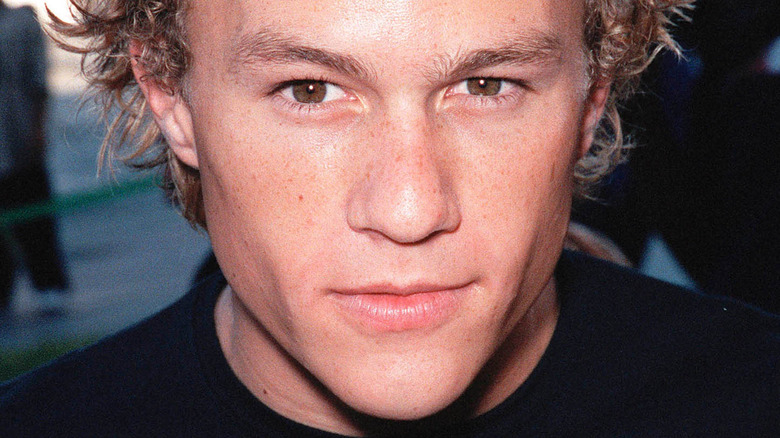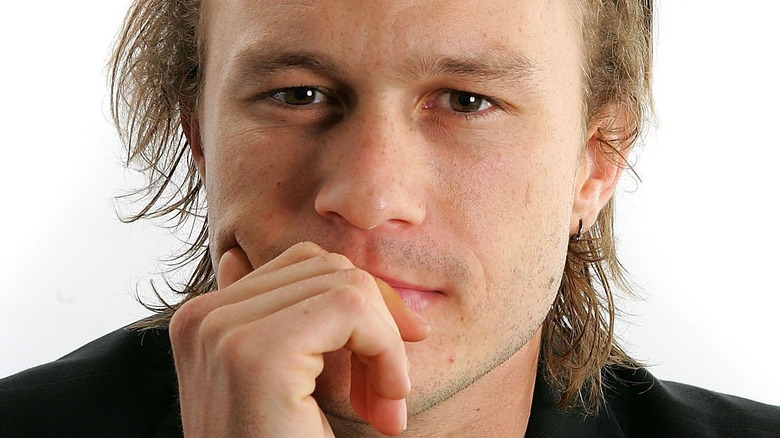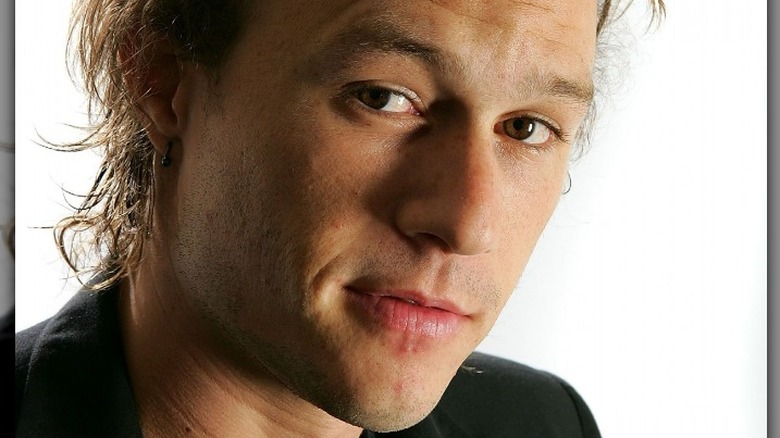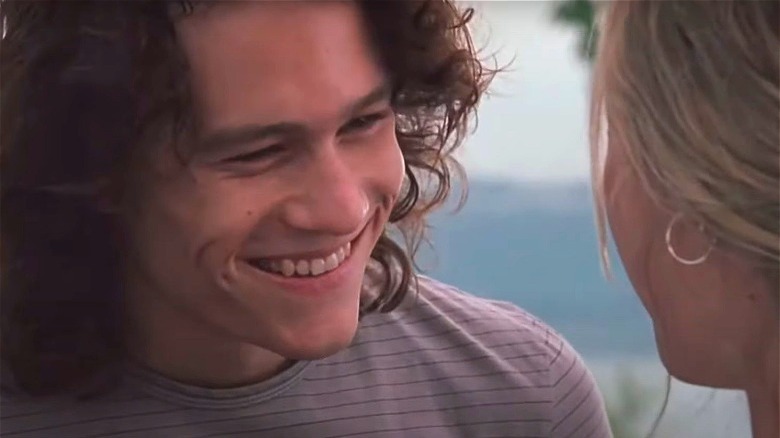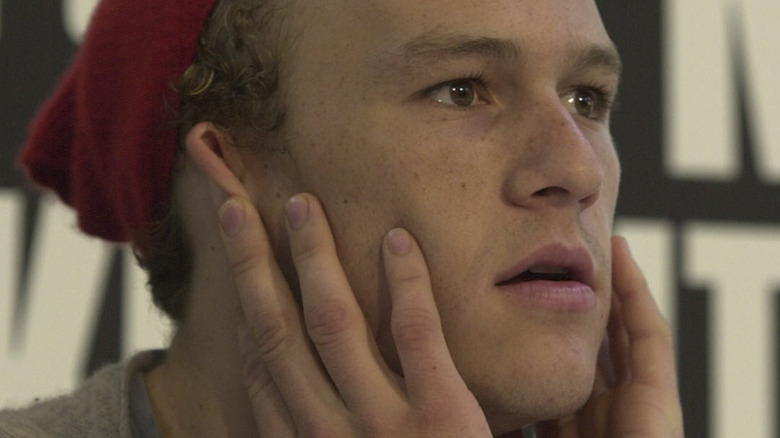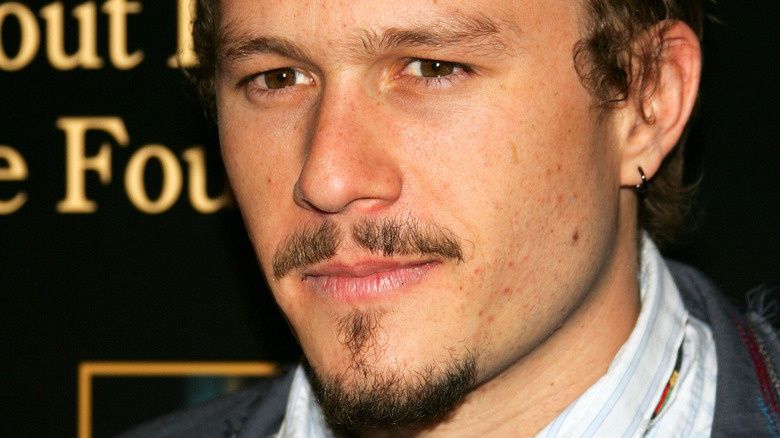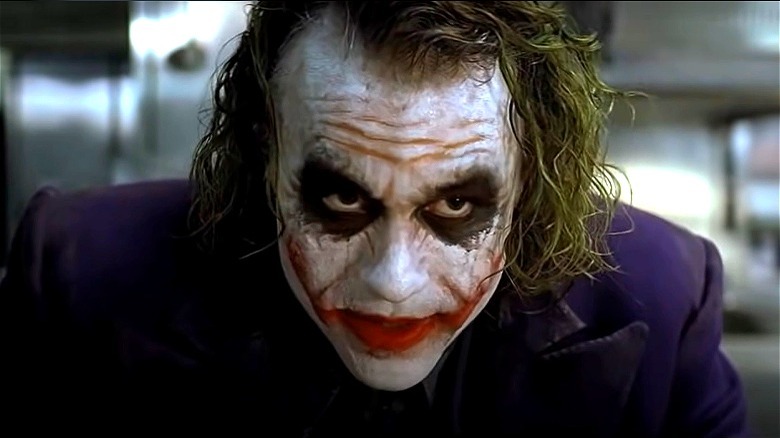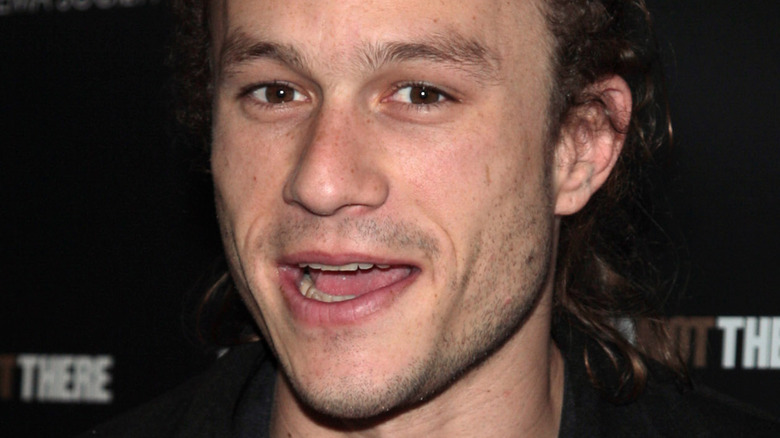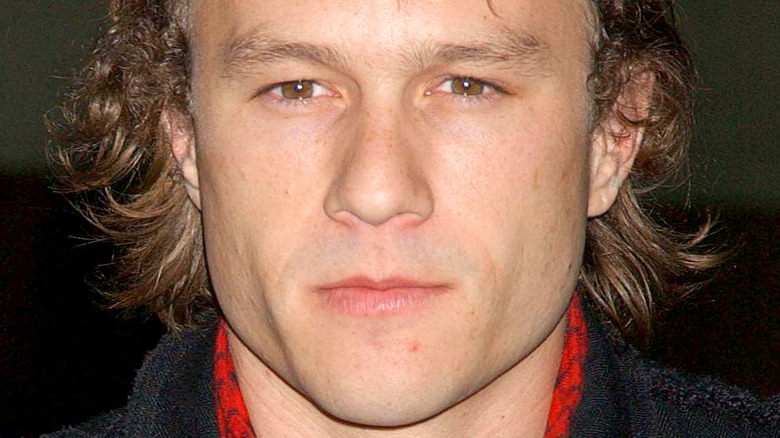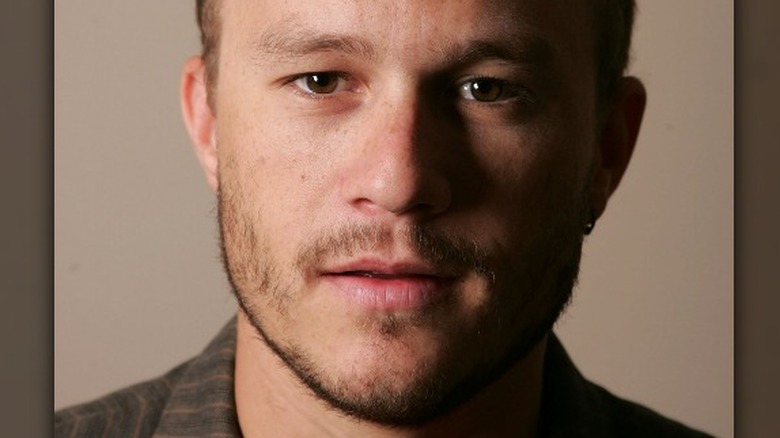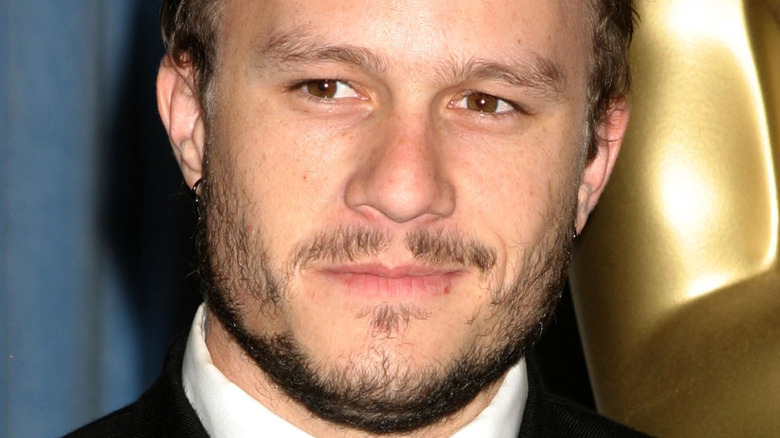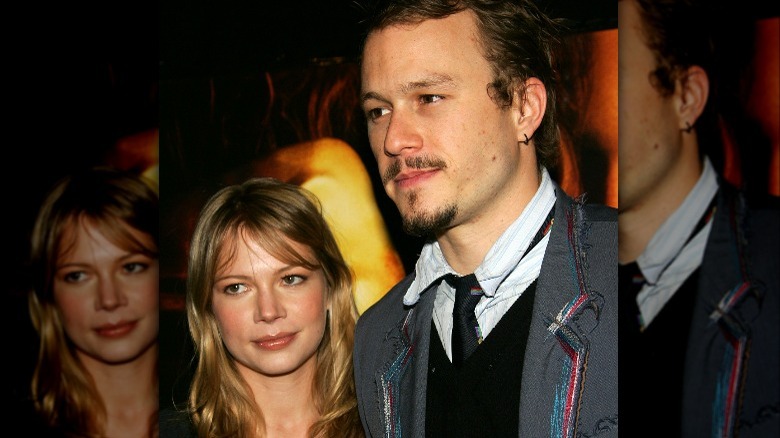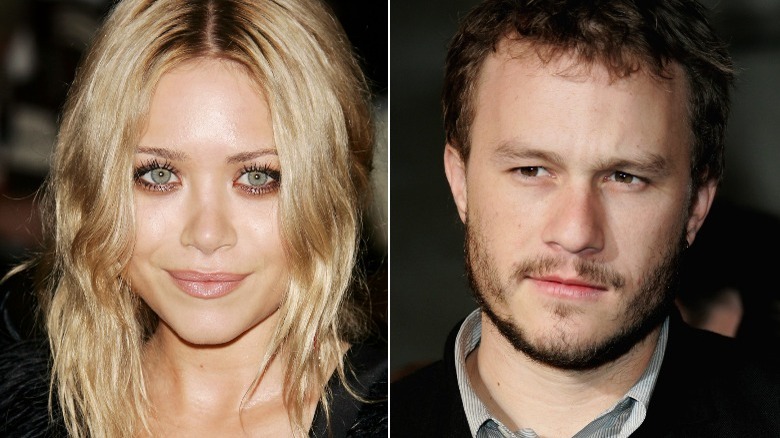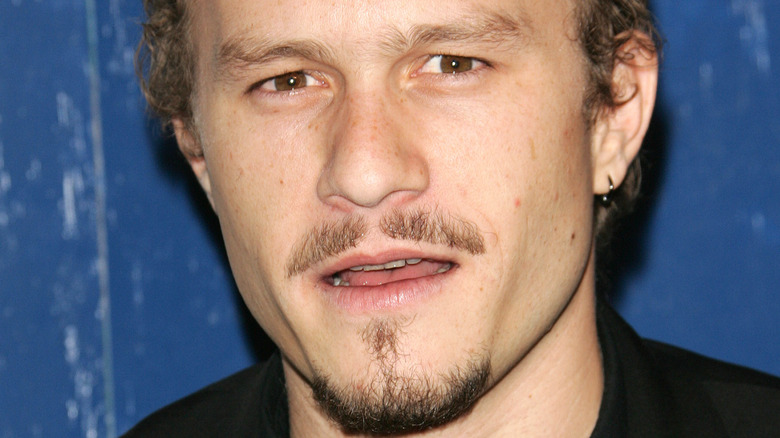Things We Learned About Heath Ledger After He Died
This article contains references to drug use, mental health issues, and suicide.
In the tabloid frenzy that followed the shocking news, there were things we learned about Heath Ledger after he died that only added to the tragedy, and the mystery, of the beloved actor and his untimely end. The "Brokeback Mountain" star was just 28 when he was found dead of an accidental prescription drug overdose in the Manhattan apartment he was renting, promoting a rush of intensive — and often speculative — coverage regarding the young star's short life.
In describing the grotesque obsession with the star's death, New York magazine painted the grim scene outside the star's apartment wherein "a scrum of cameras" filmed the removal of the body bag which contained his corpse. The "dreamlike spectacle ... was in its way more grotesque than the 'Hollywood Babylon' tableau in Ledger's apartment." So too was some of the coverage of the star's death, with the outlet describing "intensive coverage" by news outlets with "no cohesive narrative."
Instead, rumors and gossip flooded every void available to the news media. Suddenly, everyone was an expert on toxicology reports and could successfully theorize on the private life of an actor they'd never met. When true stories about the actor were finally published, they stood out. Some stories were still devastating, but others proved the star to be kind and fascinating, a rare talent dealing with a difficult time and struggling, without the rest of the world seeing. Here's what we learned about Ledger after he died.
Heath Ledger was more insecure than he seemed
In both charisma and talent, Heath Ledger's star power was the equivalent of a category five force on nature, on-screen. But you wouldn't know it from his reportedly high sense of self-doubt. Per Rolling Stone, the documentary "I Am Heath Ledger," the actor's agent Steve Alexander described how the actor was encumbered by insecurity on the set of period war drama "The Patriot." On top of thinking that he'd bombed the screen test — to the point that he stopped reading midway through to say, "Sorry, I'm wasting your time" — the actor also had a "crisis of confidence" on-set, due to getting "caught up in the fear of whether or not he could accomplish what he wanted to do." His insecurity was so intense that "he almost pulled out of every movie" he ever did, according to his agent.
It's a depiction that was echoed by others, too. Speaking to Yahoo! Entertainment, "The Patriot" director Roland Emmerich described the actor as being "super nervous" on-set, mostly on account of starring opposite his acting-hero Mel Gibson. Meanwhile "10 Things I Hate About You" director Gil Junger told The New York Times that Ledger "was nervous that he blew" his incredibly short audition. Ironically, the reading was only as short as it was because Junger was (understandably) sold on Ledger's "palpable" sense of "energy" and "sexuality" from the get-go. Weren't we all?
He shared his home with fellow Australian actors
Following Heath Ledger's death, many accounts of the star painted him as a generous and humble personality, a silver screen supernova whose ego was seemingly unaffected by his sudden fame. A key story in highlighting this fact was how he'd often share his Los Angeles home with struggling Australian actors striving for their own big break. "Bridesmaids" star Rose Byrne had first-hand experience of his kindness, and explained to Sunrise how her friend's generosity was extended to any pals who needed it (via Daily Mail).
"He always had multiple people staying at his house, like me," she explained. "There was an open-door policy, he always helped, and he would always pay for everything." In the documentary "I Am Heath Ledger," actor Ben Mendelsohn affectionately recalled that the actor's Los Feliz abode was so "renowned" in Hollywood "for having a stream of Australian actors living there." He continued, "Casting directors would ask you, 'Are you one of the Aussies that lives at Heath's place?'"
According to Vanity Fair, Ledger's house "became familiarly known as 'the Aussie artists' colony." It was a welcoming pit stop for anyone new to Hollywood from Australia; as cinematographer Nicola Pecorini shared with the outlet, "Probably 50 people had the keys." It wouldn't be the first or the last time that Ledger's fellow actors would praise their late friend for his altruistic behavior. And following his death, Australians in Film launched the Heath Ledger Scholarship to honor his selfless nature.
His impact on 10 Things I Hate About You
For many fans of the star, Heath Ledger's performance in "10 Things I Hate About You" may have been their first irrepressible introduction to the reluctant heartthrob. Apparently, he made quite an impact on the cast of the classic teen film too. Writing for Vulture, co-star David Krumholtz remembered the close-knit cast being apprehensive about the addition of "a handsome Aussie from Perth with an infectious smile" joining their "inner circle." Instead, they found another close friend. "The group, with Heath, only got stronger," he wrote.
In all respects, the actor sounded like he contributed a great deal more to the movie than just an iconic performance as misunderstood bad boy Patrick Verona. Speaking to The New York Times, director Gil Junger recalled that Ledger was the one who made the "much better call" of suggesting his character sing Frankie Valli's "Can't Take My Eyes Off You" to woo Julia Stiles' Kat Straftord with, rather than the originally scripted song "I Touch Myself" by the Divinyls.
What's more, on the "People in the '90s" podcast, Stiles remembered that Ledger "stood back" during her iconic poem scene by refusing to overshadow her performance by getting emotional during his "reaction shot." She recalled, "But he was confident enough ... to be like, 'I'm handing over the stage to you.' And I learned way later in life that doesn't always happen."
His fame made Heath Ledger uneasy
In order to sell the quirky medieval rom-com "A Knight's Tale," the powers that be seemed well aware of their most lucrative asset: The roguish good looks of Heath Ledger. The film's campaign centered around the actor, and it was apparently the first time he felt extreme discomfort about his rising fame. Per Rolling Stone, in "I Am Heath Ledger," Steve Alexander explained how the actor would be "uncomfortable and fidgeting" during interviews, and would ask to be excused "for a second" to cope. He added, "Selling the film was the part of the business he was least comfortable with."
Speaking to Vanity Fair, Alexander elaborated that Ledger was afraid of becoming "a matinee idol" whose fame would overshadow his talent and "limit his choices." Instead, he wanted to keep his personal life to himself, and to excel at his craft. "He was striving to become an illusionist," Alexander explained, "[someone] able to create characters that weren't there."
While these are details only revealed after the actor's death, the clues were there from the start. In 2005, for instance, Ledger had to apologize to Seven Network journalist Katherine Tulich for his "lack of enthusiasm" during an interview wherein he peeled and ate an orange. The actor explained it "was one of about 60 television interviews" he did in the one sitting, and that — while not "polite" — he was simply "hungry and a little dehydrated," per The Age. Arguably, he may have also been uncomfortable.
A chess champion and burgeoning filmmaker
On top of being an accomplished actor, Heath Ledger was apparently keeping another couple of talents in his back pocket. Screenwriter Allan Shiach told Independent that he and the actor were developing a film adaptation of Walter Tevis' chess prodigy novel "The Queen's Gambit" before his death. The movie was to be the actor's feature-length directorial debut, with Schiach assuring the newspaper, "I think he would have been an extraordinary director."
But there was one other talent Ledger was apparently nurturing: According to the outlet, he was a high ranking chess player "within reach of becoming a grandmaster." Although he once told MTV that he played "at least" one game of chess everyday, the extent of his skill set for the intellectual game wasn't exactly common knowledge until after he'd died. At least, not to the public. As his ex-girlfriend, "Mulholland Drive" star Naomi Watts told Interview, "He was a huge, obsessive, chess freak — and very, very good at it."
Following his death, it was touchingly revealed that Ledger was also no stranger to Washington Square Park's legendary chess world in New York, where a couple of the board regulars spoke fondly of him. 63-year-old Earl Biggs — "a spectator at Ledger's early-morning games" — recalled to People that the actor "seemed like a nice guy" and would "usually lose." Regardless, Biggs explained, "he just had fun, he loved it."
Heath Ledger guided The Joker's aesthetic
Heath Ledger's maniacal performance as The Joker in Chris Nolan's "The Dark Knight" remains his most iconic and beloved role, with the performance receiving a posthumous Oscar win in 2009. Released six months after his death, however, the majority of the actor's keen inspirations for and details about his performance were accomplished without Ledger being able to share them directly with the world.
Per Time, in "I Am Heath Ledger," the actor's voice coach and friend Gerry Grennell shared that one of the character's signature tics — wherein the Joker punctuates gestures and statements with a keen lick of his lips — was one born of practicality. Because the prosthetics required for his scarred cheeks would detach as he spoke, the actor would repeatedly lick his lips to quickly reseal the special effect, giving the clown prince of crime his jarring mannerisms.
It was a decision which made sense given Ledger's naturalistic approach to the character. According to Chris Nolan, the actor was heavily involved in guiding the aesthetic of the character, including applying his makeup. In a behind the scenes video from Warner Bros, the "Tenet" director explained, "As an actor, he was saying, 'Okay, this character would put his makeup on in real-life, so what would that look like?'" The result was a wonderfully crude figuring of Gotham's cruelest criminal — a man whose mask of proud anarchism was smeared onto his own face by Ledger's hand.
Playing The Joker didn't destroy Heath Ledger
In the tabloid furor following Heath Ledger's death, outlets like Metro and The Sydney Morning Herald ran stories suggesting that the dedicated actor had sunk too deeply into his dark performance as The Joker, and that it had killed him. As his family and co-stars argued, however, that couldn't be farther from the truth.
Ledger's "The Dark Knight" co-star Christian Bale told Today that he found such reports "very rude ... for such a tragedy" and suggested that though the actor "immersed himself completely in his role" that it didn't harm him in some way. "He was having a wonderful time making this movie," he explained, "I say he couldn't have been happier." Per the Daily Beast, while speaking at a panel event for "I Am Heath Ledger," the actor's sisters Kate Ledger and Ashleigh Bell similarly suggested that the star was having the time of his life depicting The Joker.
So, when stories came out portraying Heath as being "depressed" because of the role, they were shocked. "Honestly, it was the absolute opposite," Kate explained, "He was having fun. He wasn't depressed about The Joker." Speaking to News.com.au, Kate further dismissed allegations that her brother had a darkness to him and explained, "he was a really happy person and he had huge plans for his future. ... I know he had plans for another Batman." Be that as it may, contradictory reports suggest that Heath was struggling with his mental health prior to his death.
Heath Ledger struggled with insomnia
Reflecting on the final weeks of Heath Ledger's life, the actor's friend and dialect coach Gerry Grennell recalled to People that "he was desperately unhappy, desperately sad" following his split from Michelle Williams. The voice coach had spent some time living with Ledger in his apartment prior to his death, and told the outlet that the actor seemed "emotionally and physically ... exhausted." Unable to sleep, the "Brokeback Mountain" star would apparently wander around his apartment.
Grennell's account is seemingly backed up by an interview Ledger gave to The New York Times two months before his death, wherein he confessed to having "slept an average of two hours a night" because he couldn't get his mind to quieten down. According to Williams, Ledger's restless brain wasn't anything new, however. She told Interview, "For as long as I'd known him, he'd had bouts with insomnia. He just had too much energy. His mind was turning, turning, turning — always turning."
During the filming of "The Imaginarium of Doctor Parnassus," director Terry Gilliam likewise recollected to Vanity Fair that Ledger would arrive for work "completely knackered ... because of lack of sleep." But through his performance, he was able to resurrect himself and would be "glowing" by the end of the day. "It was like everything was put into the work," Gilliam explained, "because that was the joy; that's what he loved to do."
If you or someone you know is struggling with mental health, please contact the Crisis Text Line by texting HOME to 741741, call the National Alliance on Mental Illness helpline at 1-800-950-NAMI (6264), or visit the National Institute of Mental Health website.
Heath Ledger may have had pneumonia prior to his death
Another reason for Heath Ledger's apparent "exhaustion" prior to his death was that the actor was reportedly experiencing some bad physical health. According to Vanity Fair, during filming of "The Imaginarium of Doctor Parnassus," the actor was apparently told he had "the beginning of pneumonia" and needed to "go home and rest." According to Terry Gilliam, the actor wasn't very fond of the idea — particularly given the situation concerning his separation from Michelle Williams.
According to the filmmaker, Ledger had said something to the effect of, "No way. I'm not going home, because I can't sleep, and I'll be just thinking about the situation. I'd rather stay here and work." His body, apparently, was struggling to keep up, however. Co-star Christopher Plummer told People that working on the film could involve some less than pleasant conditions which contributed to poor health for everyone working on the flick. "We all caught colds because we were shooting outside on horrible, damp nights," he explained.
However, while everyone else got better, Ledger didn't improve. "I don't think he dealt with it immediately with ... antibiotics," Plummer explained, "I think what he did have was the walking pneumonia." Sadly, there was potentially another looming health concern that may have also been a pervasive part of the star's life prior to his death.
Did Heath Ledger use drugs?
Almost immediately after Heath Ledger's death was reported, tabloids began circulating stories which alleged that the actor may have had a history of misusing drugs and alcohol. One particularly damning piece published by the Daily Mail saw a woman called Rebecca White — described as being from his "inner circle" — alleging the actor was a "partygoer" whose "reckless" use of cocaine and heroin had destroyed his relationship with Michelle Williams.
The same day the Daily Mail piece was published, footage appearing to show Ledger supposedly snorting a "cocaine-like substance" at an after party for the 2006 SAG Awards began circulating, per Boston.com. The outlet reported the star as talking about how he "used to smoke five joints a day" in the video, and how he was going to "get so much s***" from Williams for using drugs. While the tabloids picked at the bones of such unpleasant spectacle, another image of Ledger emerged: A man trying to make life changes, and succeeding.
Nicola Pecorini told Vanity Fair that Ledger "went clean as a whistle" the second that discussions about custody over his daughter were brought up. He told the outlet, "He was so ... clean that he didn't drink a glass of wine anymore." Meanwhile, David Krumholtz told The New York Times that he'd reconnected with the star prior to his death and saw a changed man, explaining, "I know for a fact he was in recovery prior to his death. He was trying to get healthy."
If you or anyone you know is struggling with addiction issues, help is available. Visit the Substance Abuse and Mental Health Services Administration website or contact SAMHSA's National Helpline at 1-800-662-HELP (4357).
His split from Michelle Williams was difficult
Four months prior to his death, Heath Ledger and Michelle Williams split amidst speculation from an unnamed source that their relationship had been "rocky for a while," per People. Though the breakup was described as amicable by the outlet, details emerged following the star's death potentially suggesting otherwise. People reported that an "irreparable rift" was caused between the two due to Ledger being "drawn deeply into a bi-coastal party scene" (via Today). It was reportedly a lifestyle which Williams wanted to protect their daughter, Matilda, from. According to Today, People's senior editor JD Heyman claimed to Access Hollywood that Ledger was a "known user of drugs," something which he suggested was "[incompatible] with raising a child ... at least in Michelle Williams' eyes." Terry Gilliam told Vanity Fair that the breakup was hard on Ledger, but the worst part was him being "overwhelmed by lawyers" in the custody dispute regarding his daughter.
The filmmaker said he "was trying to be decent and graceful, give her whatever she wanted ... but once it started going south, it went very quickly." Still, could a reconciliation have been possible? In her memoir, "This Will Only Hurt A Little," Busy Philipps — godmother to Matilda, and Williams' best friend — wrote that she always thought "something would be figured out and it wasn't the end of the story for them." Tragically, we'll never know.
He was alleged to be 'casually dating' Mary-Kate Olsen
In the immediate aftershock of the news, strange details surrounding Heath Ledger's death started to emerge. As noted by New York magazine, conflicting reports had initially suggested the actor was "found in Mary-Kate Olsen's apartment" and "dead of apparent suicide." Later, it was revealed that a masseuse found the actor in his own home, of an accidental death. Played out "in real time," the story of Ledger's death may have altered in accuracy, but the mysterious inclusion of the former "Full House" star as part of the narrative remained.
As The New York Times reported, "the masseuse who discovered Mr. Ledger unconscious told them that she made two phone calls to the actress Mary-Kate Olsen" before she called the police. It was a strange fact, made all the weirder because nobody even knew that the two stars were friendly — never mind speed-dial friendly. According to People, however, a source alleged that the two had been "casually dating for three months" with "a bond that was based on partying." Eyebrows were raised.
In investigating Ledger's mysterious death, federal officials had reportedly interviewed a number of people close to the actor with a source telling New York Post, "Everyone has been very eager to help ... except Mary-Kate, who has refused to speak." By August 2008, however, the U.S. Attorney's Office had closed its investigation into Ledger's death, with Olsen's lawyer maintaining that the 21-year-old "had nothing whatsoever to do with the drugs found in [Ledger]'s home."
If you or anyone you know is having suicidal thoughts, please call the National Suicide Prevention Lifeline at 1-800-273-TALK (8255).
Heath Ledger was warned about prescription drugs
The tabloid scrutiny surrounding Heath Ledger's death pivoted around the way he died: An accidental overdose of prescription drugs, and an underlying mystery as to where and how he procured all of them. As reported by ABC News, however, the medications which killed the actor — a "lethal cocktail of painkillers, anti-anxiety medication and sleeping pills" — were all found to have been prescribed in a lawful manner, though they should never have been taken together.
Speaking to the Daily Mail, his father, Kim Ledger, described the tragedy of his son's death as being "totally his fault ... no-one else's." He also told News.com.au that Heath's sister Kate Ledger had warned him not to "mix drugs" he knew nothing about, "He said, 'Katie, Katie, I'll be fine.' Well, that's a cavalier boy's answer," he explained. "It just put his whole system to sleep I guess." The late actor's father noted in a statement that he hoped his son's death would serve "as a caution to the hidden dangers of combining prescription medicine, even at low dosage," per Today.
Apparently, Kate wasn't the only one to try to step in. Jack Nicholson, an actor who had likewise once depicted The Joker, said he also advised the "Brokeback Mountain" actor against using Ambien. Per The Mirror, the "Batman" star said he himself almost "drove off a cliff" near his home after taking it, and subsequently "warned [Heath] to stop" using the drug, too.

